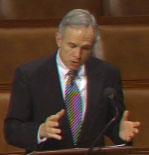 The House Committee on Science and Technology Energy and Environment Subcommittee this week looked into the country’s readiness to meet the demands of alternative fuels.
The House Committee on Science and Technology Energy and Environment Subcommittee this week looked into the country’s readiness to meet the demands of alternative fuels.
The subcommittee heard testimony relating to H.R. 547, the Advanced Fuels Infrastructure Research and Development Act, a bipartisan bill introduced by Committee Chairman Bart Gordon (D-TN), pictured here on the floor of the House. According to a committee release, the bill directs the Department of Energy (DOE) and the National Institute of Standards and Technology (NIST) to initiate a research, development, and demonstration program to make alternative biobased fuels more compatible with present-day infrastructure. H.R. 547 also directs these agencies to develop technologies and methods to provide low-cost, portable, and accurate measurements of sulfur in fuels, and to develop a physical properties database and Standards Reference Materials for alternative fuels.
 Among those who testified was Renewable Fuels Association President Bob Dinneen who discussed the technological advancements being made in the ethanol industry and the important role government can play in assisting private industry in developing new technologies and expanding ethanol infrastructure.
Among those who testified was Renewable Fuels Association President Bob Dinneen who discussed the technological advancements being made in the ethanol industry and the important role government can play in assisting private industry in developing new technologies and expanding ethanol infrastructure.
“The ethanol industry today is on the cutting edge of technology, pursuing new processes, new energy sources and new feedstocks that will make tomorrow’s ethanol industry unrecognizable from today’s,” said Dinneen. “Ethanol companies are already utilizing cold starch fermentation, corn fractionation, and corn oil extraction. Companies are pursuing more sustainable energy sources, including biomass gasification and methane digesters. And there is not an ethanol company represented by the RFA that does not have a cellulose-to-ethanol research program.”

